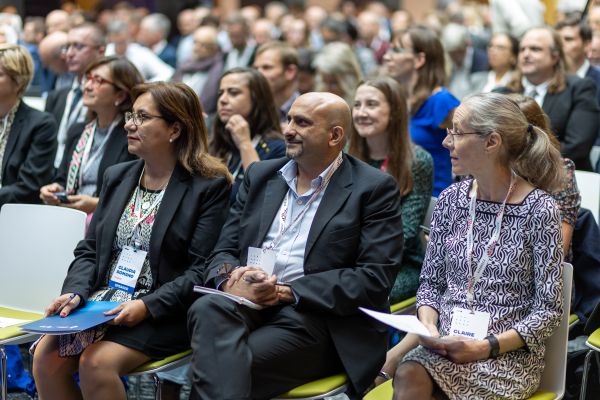Judicious investment in research and innovation projects followed by sustainable long-term financing is a way to forestall and improve managing worldwide crises and mitigate the effects of environmental pollution. Researchers should make better use of research infrastructures, share their data and experience, and make their insights and capacity available for solving social issues. These are the conclusions reached by the participants in the International Conference on Research Infrastructures (ICRI) that took place in Brno as detailed in the Brno Declaration.
The three-day event saw close to 500 researchers and managers from all over the world debate sharing research infrastructures or RIs, including equipment, devices and data, international cooperation, financing, sustainability and energy-saving options for power-hungry facilities. They also discussed the mobilisation of research infrastructures to face the challenges of COVID-19 and ways to strengthen preparedness for future crises.
“Investment in research and innovation is one of the key approaches to tackling the current energy crisis as well as any future crisis. Solutions must come from people with a deep understanding of the problem, and we must support science to find the solutions,” said Vladimír Balaš, the Czech Minister of Education, at the opening of the conference.
Crucially, it is beyond the reach of any one country to run all the necessary infrastructure on its own – as was noted in another opening speech delivered by Signe Ratso, who represented the Directorate-General for Research and Innovation of the European Commission.
The Brno Declaration
The conference participants laid out the current status and challenges of research infrastructures in a single document: the Brno Declaration on Fostering a Global Ecosystem of Research Infrastructures.
The declaration invites politicians responsible for research and innovation to support research and innovation infrastructures as the cornerstones of open research that can play a key role in creating the knowledge centres and local innovation centres that are so vital for regional and local economies.

Ondřej Hradil from Masaryk University, who was a key organiser of the conference and one of the initiators of the declaration, said the declaration “spelt out the challenges currently faced by research infrastructures, the steps needed to tackle them and the stakeholders that must be involved”, adding that despite the differences in the numbers and capacities of research infrastructures in different parts of the world, it turns out they often face similar challenges and issues.
One of these issues is that the research outcomes are underutilised by the policymakers in their target sectors.
“While research as such is usually part of the agenda of the government’s education department, its outcomes are often needed elsewhere, whether it’s healthcare – as highlighted by the latest pandemic – transport, the energy sector and so on,” said Hradil.
The Brno Declaration calls for the “convergence of responsible policy-making on RIs with other sectorial policy-making in areas such as energy, environment, agriculture and health, where RIs not only contribute to knowledge-based solutions to grand societal challenges but help facilitate sustainable prosperity”.
Problems without borders require research without borders
Communicating the research outcomes and insights to the decision-makers: This theme ran through almost all the topics that were discussed, from the social and economic contribution of research infrastructures to sharing research data.

According to Jana Kolar, the chair of ESFRI (European Strategy Forum on Research Infrastructures), the importance of meaningful communication became palpable during the COVID-19 pandemic when research insights had to be quickly communicated to politicians and the general public.
“Miscommunication during a pandemic can have a major impact on people’s lives”, says Kolar. She added that this underlines the need to work together with the humanities and social sciences in these scenarios.
The need for interdisciplinary and, indeed, intercontinental research and cooperation between science and industry was seen as key by members of the panel that explored environmental issues, such as climate change and mitigation of its impact, within the broader conference topic of solving global social issues through research infrastructures. “If you are looking for solutions to environmental issues that have no borders, you need open-access data,” said Agnès Robin from the Directorate-General for Research and Innovation of the European Commission.
Communicating science better
Many of the speakers at the conference suggested ways to improve how research outcomes are communicated to decision, policy and opinion-makers as well as the general public, including understanding your audience, focusing on people’s interests and needs, making use of visualisations, keeping it simple and inviting feedback.

Among those who contributed to this topic was Daniel Stach, a Czech Television presenter who focuses on popularising science. He opened the conference by quoting Albert Einstein: “Imagination is more important than knowledge”.
Another conference panel discussed ways to make sure we are making the best use of the available funding and to measure the contributions made by research infrastructures.
Michael O’Neill, the director of the Canada Foundation for Innovation, says that investment in research infrastructure has a positive impact on the economy and society at large, not only on scientific excellence. This is because the funding goes towards qualified professionals as well as equipment: “It can spark and accelerate social and economic development locally and in the neighbouring regions and attract further public and private funding in the form of science parks and innovation centres, increase labour demand and contribute to better civil infrastructures and public services.”
Digitisation and data sharing boom
Open sharing of research data was a hotly debated topic among the participants. According to Anna Panagopoulou, the director of the European Research Area & Innovation, the amount of open-access data increased by over 530% in the last ten years.
One of the conclusions reached by the conference group on data sharing was prioritising cooperation over competition.
This requires tackling two crucial challenges facing this area: how to make sharing as easy as possible and protect the data against misuse at the same time.
